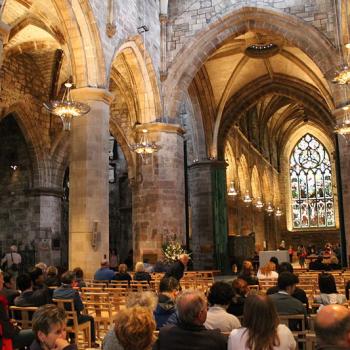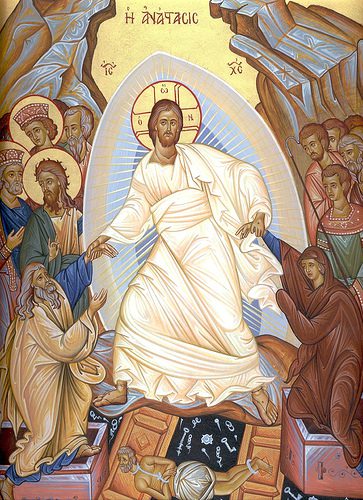by guest writer Jared D. Carl
We must be on guard against theological errors lurking behind ostensibly Catholic political analysis and commentary. Too often, partisan politics obscures bad theology. That’s because we like the political conclusion, so we don’t question the underlying theological assumptions, or we accept them as “Catholic” at face value. As a result, pernicious theological errors creep into our lives through our politics, corrupting our faith and moral conscience.
A perfect example of this is Nicholas P. Cafardi’s essay in Voting and Faithfulness: Catholic Perspectives on Politics. Cafardi begins his essay by criticizing the U.S. Bishops’ use of intrinsic evil in Forming Consciences for Faithful Citizenship. The concept of intrinsic evil, he writes, isn’t “evangelical,” by which he means it doesn’t come from “the Gospels, the words of Christ as reported to us by the evangelists.” Instead, he writes, the concept of intrinsic evil is a medieval construct rooted in the theological speculation of St. Thomas Aquinas.
This is a curious position for Cafardi – or any Catholic – to take; the Magisterium of the Church teaches infallibly that some acts are intrinsically evil. In Evangelium Vitae, for example, Pope St. John Paul II writes that murder, abortion, and euthanasia are intrinsically evil. Although Cafardi doesn’t consider the concept of intrinsic evil “evangelical,” John Paul II writes that the intrinsically evil nature of these acts is affirmed by the moral law and Sacred Scripture, transmitted by Tradition, and taught by the ordinary and universal Magisterium. The Congregation for the Doctrine of the Faith confirms that the Church “commits her infallibility” to the teaching that certain acts are intrinsically evil.
Rather than properly convey a penetrating insight into the nature of certain evil acts, Cafardi drives a wedge between the Church and “the words of Christ.” He tells his reader that the concept of intrinsic evil is merely a way for the Church to “absolutize moral principles” and tyrannize modern man with an arbitrary list of “do nots” from medieval theology. Not only is this a great disservice to the moral formation of his reader, it subtly invites the reader to reject any teaching of the Church – even an infallible teaching – that the reader doesn’t consider “evangelical.”
But that isn’t the only danger to one’s faith and conscience lurking behind Cafardi’s political analysis. Elsewhere in his essay, Cafardi misrepresents the Church’s teaching on murder. He writes that, in Catholic theology, “intrinsic evil encompasses acts such as lying, contraception, masturbation, fornication, adultery, and homosexual acts,” but “it does not encompass murder.” In Catholic theology, he asserts, murder “is not always morally wrong, as for example, when you kill someone in self-defense.”
Cafardi is flat-out wrong in this assertion. According to the Church, murder is always and everywhere wrong; it’s intrinsically evil. The Catechism of the Catholic Church 1756 clearly states, “There are acts which, in and of themselves, independently of circumstances and intentions, are always gravely illicit by reason of their object; such as blasphemy and perjury, murder and adultery.” And, as mentioned above, the Church, by the ordinary and universal Magisterium, teaches infallibly that murder is intrinsically evil.
Regarding self-defense, the Church makes it perfectly clear that legitimate self-defense “is not an exception” to the prohibition against murder (CCC 2263). Rather, love for oneself is a fundamental moral principle, and therefore, if one is acting legitimately in self-defense to protect one’s own right to life, one isn’t guilty of murder even if one is forced to kill the aggressor. The Church even emphasizes that acting in self-defense or in defense of others, in addition to being legitimate, can be a moral duty for someone responsible for the lives of others. In those situations, it’s a grave duty to render an unjust aggressor “unable to cause harm” (CCC 2265).
Cafardi also misrepresents the Church’s moral teaching on lying. He tells his reader that, in Catholic theology, lying is an intrinsic evil, morally wrong at all times and in all situations, but then goes on to ask: “But would you hesitate to lie if you were living in occupied Europe in the 1940s and the Gestapo asked you if you were sheltering Jewish people in your home? I hope that you would not hesitate. You would not think twice. You would lie.”
The unsuspecting reader of this paragraph will have a difficult time resisting the implication of those four sentences. If the Church teaches lying is intrinsically evil, and all morally upright people would lie to the Gestapo without hesitation and with a clear conscience, then clearly the Church is wrong. This thought plants a seed in the mind of the reader: If the Church is wrong about lying, what else is she wrong about? Abortion? Euthanasia? Same-sex marriage?
The problem with Cafardi’s Gestapo example is that he fails to make even the slightest attempt to explain the Church’s teaching on lying; he simply lets the Gestapo scenario echo in the mind of his reader, going about its business of undermining the Church’s moral authority.
In reality, what constitutes lying is a subject of significant theological reflection. If we consult the Catechism, we learn, “The right to the communication of the truth is not unconditional” (CCC 2488). The Church teaches that one must conform one’s life to the precept of fraternal love, but in concrete situations one must have the moral clarity to be able to judge correctly whether or not it’s appropriate to tell the truth. Ultimately, the Church is clear: “No one is bound to reveal the truth to someone who does not have the right to know it” (CCC 2489).
The Church also teaches that the good and safety of others is a sufficient reason to be silent or to use discreet language (CCC 2489). If silence or discreet language is insufficient, one could argue that issuing a false statement is permissible, since “a lie consists in speaking a falsehood with the intention of deceiving” someone who has the right to know the truth (CCC 2482). In the case of the Gestapo, the false statement would be issued in fraternal love, with the intention of protecting innocent lives, and to an agent of an unjust government that doesn’t have the right to know the truth.
In any event, the Church’s teaching on lying is much more nuanced than Cafardi lets on. But rather than illuminate the Church’s moral teaching, Cafardi obscures it, leaving his reader in the precarious position of receiving poor moral guidance when the reader thinks he or she is receiving “conscience formation.”
This is especially troubling because a well-formed conscience is required so that while participating in politics one isn’t guilty of formal cooperation with evil and unworthy to receive Holy Communion. The Bishops are clear in Forming Consciences for Faithful Citizenship that a Catholic cannot vote for a candidate who supports a policy promoting an intrinsically evil act if the voter’s intent is to support that policy.
But if intrinsic evil is merely a remnant of medieval theology, and the Church’s moral teaching on issues like murder and lying is wrong, then why couldn’t I vote for a candidate who supports a policy promoting a supposed intrinsic evil? Isn’t that just political rhetoric? Don’t both sides just accuse the other side of being and promoting evil? I can judge for myself what’s “Catholic” – what’s “evangelical,” what’s “evil.”
We see now why Cafardi’s errors are so pernicious.
The Bishops go to great lengths to show that a Catholic can still reasonably decide to vote for a candidate who holds unacceptable positions, so long as the voter rejects those positions. But in order to permissibly vote in this manner, the voter must have “truly grave moral reasons” and be “guided by a well-formed conscience.” A well-formed conscience recognizes that not all issues carry the same moral weight, and that some issues have a special claim on our conscience and actions. We have a moral obligation to oppose policies promoting intrinsically evil acts.
While this framework ought to be enough for Cafardi to guide his reader through the complexities of contemporary American politics, he instead corrupts his reader’s conscience and renders this decision-making process impossible. Far from receiving proper conscience formation, the reader is cut off from the Church’s social and moral teaching, susceptible to sin, and potentially unworthy to receive Holy Communion.
Precisely because the need for moral clarity is so great when voting, faithful Catholics who desire to cast their vote with a well-formed conscience should avoid Cafardi’s brand of “conscience formation.” Instead, Catholics should consult the authoritative moral teachings of the Church and seek earnestly to apply her moral principles to social life in a proper and prudential manner. Most importantly, Catholics should make every effort to understand Catholic theology in order to protect their faith and conscience from abuses at the hands of “Catholic” political analysis and commentary.
image credit: shutterstock-phone-group.jpg













